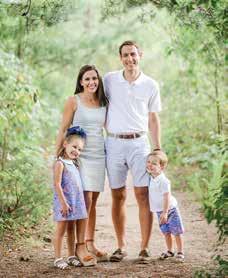
3 minute read
For Your Health
Heart Attacks Can Happen to Anyone
Cornelius mom has a lifesaving message
Advertisement
by Martin Rose photography courtesy of Tara Marie Photography
Lauren Dungan with husband Evan and Madison (5) and Hunter (3).
Cornelius mom Lauren Dungan is on a mission: Make younger adults aware that heart attack warning signs apply to them also, not just older people, so they will seek help at any sign of symptoms.
Dungan’s motivation comes from her own near-death experience just days after giving birth to her second child, Hunter.
“It was three years ago but I remember the day vividly,” Dungan says. “I was posting a picture of Hunter on Instagram five days after giving birth when out of nowhere came intense chest pressure. At the time I did not call it chest pain. In a million years I did not think that is what it could be at my age and health.”
ListENiNg tO whAt yOur BODy tELLs yOu
“I waited but the pain did not get better and I started getting nervous,” Dungan, who was 33 at the time, recalls. “At the time we were living next to Novant Health Huntersville hospital. I hesitated about five minutes with pain, but it was so severe my husband drove me next door to the hospital.”
On arrival, doctors performed an EKG test. Concerned about what they saw, Dungan was rushed by ambulance to Charlotte’s Novant Health Presbyterian. On arrival, doctors determined that Dungan had suffered a SCAD (spontaneous coronary artery dissection) heart attack. “They said my coronary artery was 80 percent blocked and required emergency bypass surgery,” Dungan says. “Doctors told my husband if they did not operate immediately then I would not make it.
“I remember saying goodbye to my husband as I was taken into surgery,” Dungan says. “It was very emotional. It felt like something out of a movie. They told me something so dire. I knew I really needed to tell my husband how much I loved him.”
wAkiNg uP tO hEArt fAiLurE
Dungan’s surgery lasted six hours. When she awoke, Dungan was in heart failure (a chronic condition where the weakened heart can’t supply enough blood). “I wondered, what if I am not here for my children? The uncertainty was most difficult,” she says. “Not knowing my future. Would I lead a normal life? For how long?” Although SCAD causes a small percentage of heart attacks overall, it’s responsible for 40 percent of heart attacks in women under the age of 50. SCAD differs from typical heart attacks in that most patients are healthy young women with no conventional heart disease risk. It is often linked to the stress of pregnancy and childbirth.
SCAD occurs when a tear forms in a blood vessel in the heart, slowing or blocking blood flow and causing a heart attack or sudden death.
Over time Dungan improved and wanted answers. “I wanted to know everything I can to educate myself and others,” she says. Dungan enrolled in a national SCAD research study at the Mayo Clinic. “That made me feel like I was doing something and finding some answers.”
EDucAtiNg OthErs
She created the North Carolina SCAD survivor’s group on Facebook, which has grown to 96 members. “Many of us underwent the same things,” Dungan said. “We share a bond. It’s therapeutic to share our stories.” She is also very active and a frequent speaker for the Charlotte American Heart Association chapter.
She continues to gain strength and become more active. “I’m off heart medication. I run and work out a lot.” Dungan credits her specialist, Dr. AlMahameed Amjad, for her successful recovery. “He recognized my SCAD heart attack immediately and knew how to treat it.”
Her advice to young men and women? “Don’t discount your symptoms,” Dungan says.” If you’re having abnormal feelings, just go to the hospital. Don’t delay. The worst they can say is, ‘It’s heartburn, go home.’ Timing is everything. I got myself to the hospital quickly. That is why I am doing so well today.”
Dungan’s children are now 3 and 5. She works in compliance at Wells Fargo.










